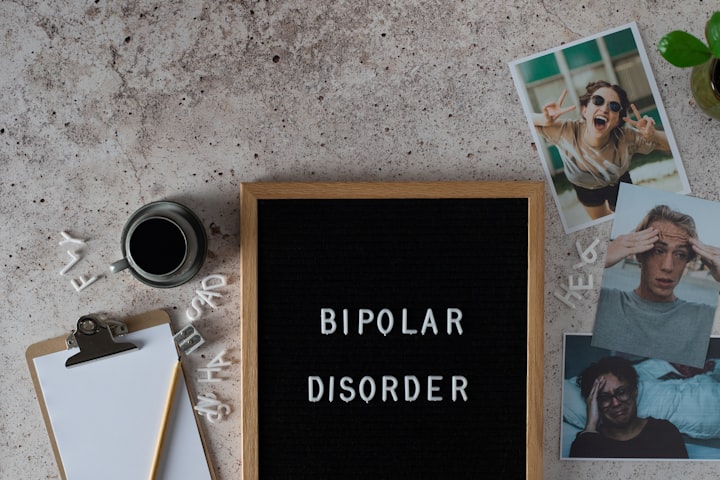Bipolar Disorder Can Affect Every Aspect of Our Lives
Causes and Symptomps.

People with extreme mood swings, from severe depression to manic episodes, may suffer from bipolar disorder. People who suffer from bipolar disorder tend to have a euphoric mood, be hyperactive, agitated, and do not feel the need to sleep. During depressive episodes, people who suffer from this disorder are sad, hopeless, guilty, and/or worthless, and have low energy levels.
It is a mental disorder characterized by extreme mood swings, from high mood, manifested by anger and hypomania, to low mood, manifested by depression. Bipolar disorder is a category of mood disorder and has been called manic-depressive disorder in the past.
When the patient becomes depressed, he feels sad and hopeless and loses interest and pleasure in most activities. When his mood changes into mania or hypomania (a less extreme form than mania), he feels euphoric and full of energy. These mood swings affect her sleep, activities, behavior, and ability to think clearly. Changes in mood swings may occur infrequently or may occur in more than one year.
The exact causes of bipolar disorder are not known, but genetic factors, changes in brain neurotransmitters, and psychosocial factors are thought to be involved. The diagnosis is made by a psychiatrist based on the history of the manifestations. Treatment consists of medication and sometimes psychotherapy.
What is bipolar disorder?
Bipolar disorder is a mental illness that is characterized by alternating manic attacks and depressive episodes.
This disorder is determined by heredity, mental constitution (a pleomorphic subject, ie robust confirmation), psychological profile, or a disorder of the brain centers of the mood.
Bipolar disorder is, in fact, a psychiatric disorder that is mainly characterized by an episodic personality disorder, with manic or hypomanic and depressive attacks. Usually, the manic episode is followed by the depressive one, between these states the patient is balanced from a psycho-emotional point of view.
Causes of manic-depressive disorder
It is mostly caused by an imbalance in neurotransmitters - serotonin, dopamine, norepinephrine - in the brain. This condition can be triggered depending on the situation, physical or mental, of greater or lesser importance. For example, even changing seasons can also be a trigger.
Also, the risk of developing bipolar disorder is higher in people who have relatives in the family who suffer from this condition. Stress, abuse, or other traumatic experiences also play an important role in the occurrence of bipolar disorder.
Symptoms
Among the main symptoms is lack of interest in daily activities, fatigue, difficulty concentrating, changes in sleep and appetite, lack confidence.
Episodes of mania and depression recur throughout the life of patients diagnosed with bipolar disorder. However, the vast majority of patients do not show any symptoms between manic or depressive episodes. Untreated, this mental disorder can worsen, leading to other health problems; In the patient's view, there is no way out of this situation.
Symptoms of anger include euphoria, extreme optimism, overconfidence, impaired judgment, rapid speech, chaotic thoughts, aggressive behavior, agitation, irritation, increased libido, poor concentration, or psychosis.
Symptoms of depression include sadness, suicidal thoughts, anxiety, guilt, increased or decreased appetite, fatigue, unexplained physical pain, and poor performance at school or work. This disorder has been divided into bipolar I, bipolar II, cyclothymia, and other types depending on the nature and severity of the affective episodes experienced, being described as the bipolar spectrum.
Type II bipolar disorder is manifested by mild manic episodes (hypomania), which often go unnoticed; on the other hand, depressive episodes are much more frequent and severe, and in type I bipolar disorder, depressive episodes are much more frequent than manic ones, being easier to identify by specialists.
Treatment of the bipolar disorder
Pharmacotherapy helps to stabilize the mood and reduces the level of irritability and excitability. Most patients with bipolar disorder, even those with severe forms can get a substantial stabilization of mental status. Mood stabilization treatment (thermostabilized) is usually prescribed to control bipolar disorder. In general, people with bipolar disorder continue thymostabilizing treatment for a very long time (years).
But beware: bipolar disorder is not diagnosed by a test! The psychiatrist usually makes this diagnosis based on a discussion with the patient about his mood swings. As a result of this variety of affectivity, the individual with this disorder cannot maintain friendly relations, has problems at work, has low performance, and may even commit suicide. Typically, bipolar disorder starts in adolescence or young adulthood.
Sometimes, however, it can develop from childhood or even later, into old age.





Comments
There are no comments for this story
Be the first to respond and start the conversation.